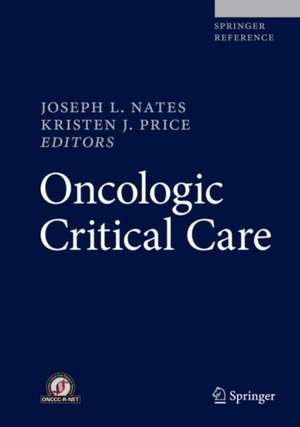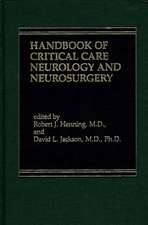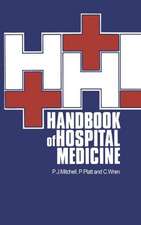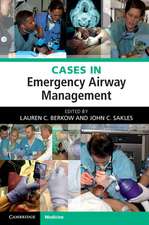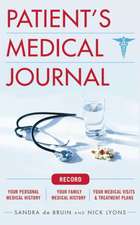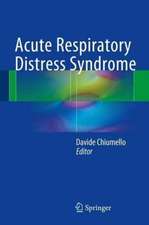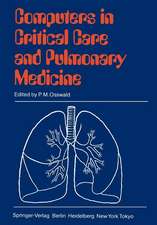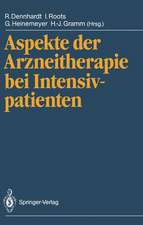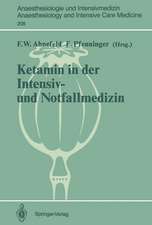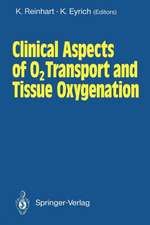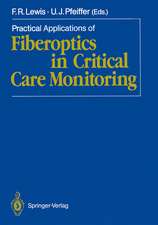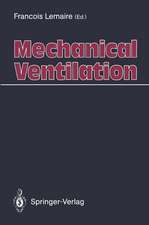Oncologic Critical Care
Editat de Joseph L. Nates, Kristen J. Priceen Limba Engleză Hardback – 30 oct 2019
This major reference work is the most comprehensive resource on oncologic critical care. The text reviews all significant aspects of oncologic ICU practices, with a particular focus on challenges encountered in the diagnosis and management of the critically ill cancer patient population. Comprised of over 140 chapters, the text explores such topics as the organization and management of an oncologic ICU, diseases and complications encountered in the oncologic ICU, multidisciplinary care, surgical care, transfusion medicine, special patient populations, critical care procedures, ethics, pain management, and palliative care.
Written by worldwide experts in the field, Oncologic Critical Care is a valuable resource for intensivists, advance practice providers, nurses, and other healthcare providers, that will help close significant knowledge and educational gaps within the realm of medical care for critically ill cancer patients.
Preț: 8172.84 lei
Preț vechi: 8603.00 lei
-5% Nou
Puncte Express: 12259
Preț estimativ în valută:
1563.89€ • 1636.94$ • 1301.64£
1563.89€ • 1636.94$ • 1301.64£
Carte disponibilă
Livrare economică 10-24 martie
Livrare express 21-27 februarie pentru 261.44 lei
Preluare comenzi: 021 569.72.76
Specificații
ISBN-13: 9783319745879
ISBN-10: 3319745875
Pagini: 1200
Ilustrații: XLV, 2099 p. 225 illus., 145 illus. in color. In 3 volumes, not available separately.
Dimensiuni: 178 x 254 x 45 mm
Greutate: 5.91 kg
Ediția:1st ed. 2020
Editura: Springer International Publishing
Colecția Springer
Locul publicării:Cham, Switzerland
ISBN-10: 3319745875
Pagini: 1200
Ilustrații: XLV, 2099 p. 225 illus., 145 illus. in color. In 3 volumes, not available separately.
Dimensiuni: 178 x 254 x 45 mm
Greutate: 5.91 kg
Ediția:1st ed. 2020
Editura: Springer International Publishing
Colecția Springer
Locul publicării:Cham, Switzerland
Cuprins
Part 1. Organization and Management of an Oncologic Critical Care Unit
1. Oncologic Critical Care Department Organization
2. Critical Care Staffing
3. ICU Admission and Discharge Criteria
4. Quality Assurance and Improvement
5. ICU Utilization
6. Current Trends in ICU Beds, Use, Occupancy, and Costs in the United States
7. Early Warning Systems for the ICU
8. Patient Risk Prediction Model (Severity of Illness Scores)
Part 2. Multidisciplinary Care
9. Rapid Response Team
10. Nursing
11. Pharmacy
12. Nutrition
13. Physical and Occupational Therapy
14. Patient Support
15. Advocacy and Social Work
16. Chaplaincy
Part 3. Advance Practice Providers
17. Role of the APPs in the Onco-ICU
18. Credentialing
19. Competencies
Part 4. Clinical Pharmacy
20. Chemotherapy
21. Considerations for Medications Commonly Utilized in the Oncology Population
22. Supportive Care Considerations
Part 5. Dermatologic Complications
23. GHVD, TEN, and Mycosis Fungoides
Part 6. Neurologic Diseases
24. Medication-induced Neurotoxicity
25. Delirium and Psychosis
26. Seizures and Status Epilepticus
27. Stroke
28. Increased Intracranial Pressure (brain mets, ich, hydrocephalus, etc)
29. Posterior Reversible Encephalopathy Syndrome (PRES)
30. Tumor-related Diseases/Neoplastic Meningitis/Leptomeningeal Disease
31. Frequent CNS Infections in the Immunosuppressed Patient
32. Intracranial Hemorrhage Focused on Cancer and Hemato-oncologic Patients
33. Spinal Cord Compression
34. TCD in the ICU
Part 7. Respiratory Diseases
35. Acute and Chronic Respiratory Failure
36. Oxygen therapy (low-flow and high-flow oxygen therapy)
37. Respiratory Care of the Critically Ill Patient
38. Management of Tracheobronchial Diseases
39. Pulmonary Hypertension
40. ARDS and the differential diagnosis of pulmonary infiltrates in the cancer patient
41. Diffuse Alveolar Hemorrhage
42. Differentiation (Retinoic acid ATRA) Syndrome
43. Late Non Infectious Pulmonary Complications in Hematopoietic Stem Cell Transplantation
44. Treatment-related Lung Injury
45. Pneumonia in the Cancer Patient
46. Ventilatory Strategies and Weaning from Mechanical Ventilation
47. Noninvasive Ventilation
48. High Frequency Ventilation
49. Prone Ventilatory Therapy
50. Bi-Level and Airway Pressure Release Ventilation 51. NAVA
52. ECMO in Cancer Patients
53. Tracheostomy: Appropriateness and Indications in Cancer Patients
54. Pleural Disease, Malignant and Benign Pleural Effusions
55. Sleep Disorders in the Oncologic ICU
Part 8. Cardiovascular Diseases
56. Hemodynamic evaluation
57. Acute Coronary Syndrome Thrombocytopenia and Antiplatelet Therapy in the Cancer Patient
58. Interventional Cardiology in the Cancer Patient
59. Arrhythmias in the Cancer Patient
60. Management of Pericardial Effusions/Tamponade
61. Chemotherapy-related Cardiovascular Complications
62. Cardiopulmonary Resuscitation in the Cancer Patient
Part 9. Gastrointestinal Disease
63. Gastrointestinal Bleeding
64. Malignant Ascites 65. Hepatobiliary Disease
66. Acute abdomen in the cancer patient
Part 10. Genitourinary Disease
67. Hematuria
68. Hemorrhagic cystitis
69. Obstructive Uropathy in the Cancer Patient
Part 11. Renal Disease
70. Acute Renal Failure
71. Renal Replacement Therapy
Part 12. Metabolic/Endocrine Complications
72. Adrenal Emergencies
73. Carcinoid Crises
74. Thyroid Emergencies
75. Electrolytic Abnormalities
76. Hypoglycemia and Hyperglycemia in the Cancer Patient
Part 13. Hematologic Diseases
77. Malignant Hematological Diseases
78. Benign Hematological Diseases
79. Immunology and molecular biology for the intensivist
Part 14. Transfusion Medicine
80. Statistics
81. Blood Products
82. Transfusion Reactions
83. Transfusion Related Lung Injury
84. Alternatives to Blood Products
85. Massive Bleeding Protocol
86. Transfusion Thresholds
Part 15. Vascular Complications
87. Management of Arterial Bleeding
88. Prevention and Management of Venous Thromboembolism in the Cancer Patient
89. SVC Syndrome
90. Catheter-related Deep Vein Thrombosis
Part 16. Infectious Diseases
91. Infection Control Procedures
92. Neutropenic Fever
93. Sepsis and Management of Septic Shock
94. Management of Multi-Drug Resistant Organisms
95. Fungal Infections
96. Viral Infections
97. Bacterial and Atypical Infections
98. Catheter and Device Related Infections
99. Nosocomial Infections and Ventilator Associated Pneumonia
100. Protozoal Infections in the Cancer Patients
101. Antibiotic Stewardship 102. Tropical diseases in the cancer patient
103. Soft tissue infections
Part 17. Post-Surgical Care of the Critically Ill Cancer Patient
104. Neurosurgery
105. Head & Neck Surgery
106. Plastic Surgery & Flap Graft Management
107. Thoracic Surgery
108. GI Surgery
109. Hepatic Surgery
110. Pancreatic Surgery
111. Genitourinary Surgery
112. Orthopedic Surgery
113. Interventional Radiology
114. Radiation Therapy & Gamma Knife Procedures
115. MRI
116. Outpatient Surgery
Part 18. Special Patient Populations
117. Management of the Pregnant Critically Ill Cancer Patient
118. Special Considerations of Hemato-Oncologic Critically Ill Patient
119. Pediatric Cancer Critical Care
Part 19. Critical Care Procedures
120. ICU Procedures by APP
121. Management of the Airway in the Cancer Patient
122. Use of Ultrasound Guidance
123. Interventional Radiology Procedures
Part 20. Ethics
124. Do Not Resuscitate Orders
125. Ethics Consultation126. End of Life Care
127. Medical Futility
Part 21. Pain Management, Palliative Care, and Outcomes
128. Acute Pain
129. Chronic Pain
130. Substance Withdrawal
131. Palliative Care in the critically ill cancer patient
132. Outcomes in Critically Ill Oncologic Patients
Notă biografică
Dr. Joseph L. Nates is a Professor at the University of Texas MD Anderson Cancer Center. He has lived and practiced medicine in several countries. Currently, he is the Deputy Chair of the Department of Critical Care in the Division of Anesthesiology, Critical Care, and Pain Medicine. Dr. Nates is also the Medical Director of the 70-bed Oncologic Surgical and Medical Intensive Care Units and the Founder and President of the Oncologic Critical Care Research Network (ONCCC-R-NET), a global organization dedicated to the advancement of oncologic critical care research and education. Through his organization, Dr. Nates has been leading the pioneering efforts to establish Oncologic Critical Care as a new subspecialty and disseminate this knowledge worldwide. As the foundation for this objective, he has led and coauthored the first two comprehensive oncologic critical care textbooks, in both Spanish and English languages. He has also established regional and global collaborative networks and organized several Oncologic Critical Care symposiums.
Throughout his career, Dr. Nates has occupied multiple leadership positions and received numerous awards, among them the Presidential Award for “Outstanding Achievement and Leadership for Elimination of Ventilator-Associated Pneumonia” from the Department of Health and Human Services and the four leading Critical Care Societies in the USA in 2012, the “Bill Aston Award for Quality” from the Texas Hospital Association, and Distinguished Service Award in 2015, as well as many other research awards during his career. In 2018, for his contributions to critical care, the American College of Critical Care Medicine awarded him the title Master of Critical Care Medicine. The same year, for his international contributions to the development of Oncologic Critical Care, the Chilean Society of Critical Care and Emergency Medicine awarded him the title International Master of Critical Care Medicine.
Throughout his career, Dr. Nates has occupied multiple leadership positions and received numerous awards, among them the Presidential Award for “Outstanding Achievement and Leadership for Elimination of Ventilator-Associated Pneumonia” from the Department of Health and Human Services and the four leading Critical Care Societies in the USA in 2012, the “Bill Aston Award for Quality” from the Texas Hospital Association, and Distinguished Service Award in 2015, as well as many other research awards during his career. In 2018, for his contributions to critical care, the American College of Critical Care Medicine awarded him the title Master of Critical Care Medicine. The same year, for his international contributions to the development of Oncologic Critical Care, the Chilean Society of Critical Care and Emergency Medicine awarded him the title International Master of Critical Care Medicine.
Dr. Kristen J. Price was born and raised in New Orleans, Louisiana. She received her undergraduate degree in Marine Science from the University of Tampa followed by a Doctor of Medicine degree from Louisiana State University Medical Center in New Orleans. She completed an Internal Medicine residency, Chief Medical Residency, and Pulmonary and Critical Care fellowship at the University of Texas Health in Houston. Following training, she joined the faculty at the University of Texas MD Anderson Cancer Center and currently holds the title of Professor and Chair, Department of Critical Care and Respiratory Care. Under her leadership, the number of faculty and advance practice providers has grown substantially. She also oversees the Respiratory Care Department and the Section of Integrated Bioethics in Cancer Care. Dr. Price developed the multifaceted “Intensive Care Unit Organizational Infrastructure” to systematically organize, establish, and sustain evidence-based clinical, educational, and research initiatives in the ICU. Her main focus of research has been in the outcomes of critically ill oncology patients, particularly those with hematologic malignancies and respiratory failure. She is an active member of the Society of Critical Care Medicine and currently serves on the “Academic Leaders in Critical Care Medicine” task force. Dr. Price has four grown children and currently resides in Houston, Texas.
Caracteristici
The most comprehensive resources on oncologic critical care
Presented in an easy-to-navigate format for ease of use
Includes over 200 high-yield illustrations and photographs
Written by worldwide experts in the field
Includes supplementary material: sn.pub/extras
Presented in an easy-to-navigate format for ease of use
Includes over 200 high-yield illustrations and photographs
Written by worldwide experts in the field
Includes supplementary material: sn.pub/extras
